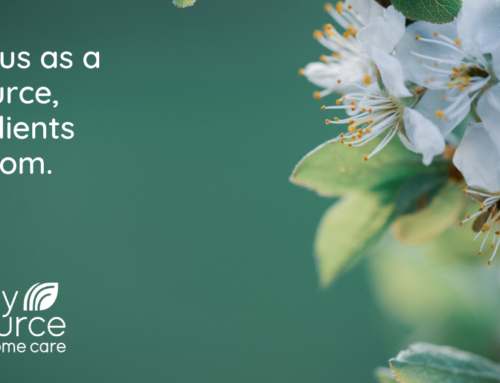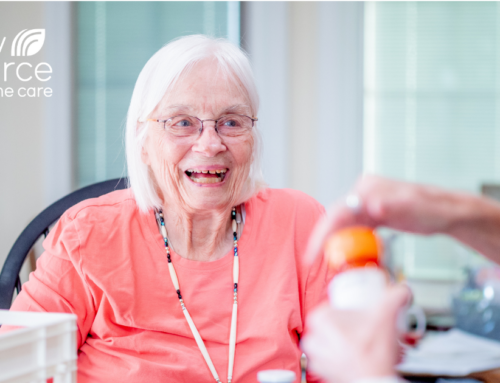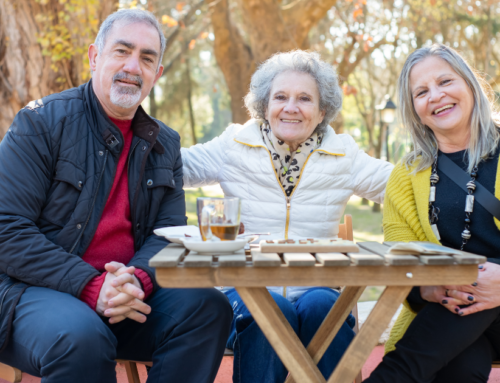Aging is an inevitable journey, but the quality of that journey can be greatly influenced by the habits we cultivate. Longevity isn’t just about adding years to life; it’s about adding life to years. Research shows that adopting specific habits can promote a longer, healthier life, and caregivers play a pivotal role in supporting seniors to embrace these practices.
The Quest for Longevity: Habits that Matter
- Nutrition: A balanced diet rich in fruits, vegetables, whole grains, lean proteins, and healthy fats is foundational. Seniors often have unique dietary needs due to changes in metabolism and nutrient absorption. Caregivers can assist by planning nutritious meals, helping with grocery shopping, and ensuring that the elder’s dietary preferences and restrictions are met.
- Physical Activity: Regular exercise has far-reaching benefits, from maintaining muscle strength and balance to enhancing cardiovascular health. Caregivers can facilitate gentle exercises tailored to the senior’s abilities, encouraging activities such as walking, chair yoga, or aquatic exercises.
- Mindful Hydration: Staying hydrated is vital for overall well-being. Caregivers can ensure that seniors have easy access to water and remind them to drink regularly, especially in hot weather or if they’re on medications that increase the risk of dehydration.
- Adequate Sleep: Sleep plays a pivotal role in physical and cognitive health. Caregivers can help seniors establish a consistent sleep schedule, create a comfortable sleep environment, and encourage relaxing bedtime routines.
- Social Engagement: Maintaining social connections is linked to improved mental and emotional health. Caregivers can organize outings, encourage participation in community events, or facilitate virtual interactions to combat social isolation.
- Cognitive Stimulation: Keeping the mind active can delay cognitive decline. Caregivers can engage seniors in activities that challenge their intellect, such as puzzles, reading, learning new skills, or even reminiscing about the past.
- Stress Reduction: Chronic stress can impact overall health. Caregivers can introduce relaxation techniques like deep breathing, meditation, or guided imagery to help seniors manage stress effectively.
- Regular Check-ups: Preventive healthcare is essential for early detection and management of health issues. Caregivers can assist in scheduling and attending medical appointments, ensuring that medications are taken as prescribed and facilitating communication between the seniors and healthcare professionals.
Caregivers as Champions of Longevity Habits
Sometimes holding yourself to habits can be challenging, especially as you age. Having a caregiver to help continue or establish some of the above habits can support longevity. Caregivers can help with personal care, transportation to regular check-ups, support cognitive stimulation by playing games or engaging in hobbies, give meal or hydration reminders and much more in Yakima, Washington and across our other locations in Oregon, Washington and Idaho.
- Education and Empowerment: Caregivers can educate seniors about the importance of these longevity habits and empower them to make informed choices. Sharing educational materials or discussing the benefits can motivate seniors to embrace these practices.
- Meal Planning: Collaborate with seniors to plan balanced meals that cater to their dietary preferences and needs. Grocery shopping together or arranging for meal delivery services can make healthy eating more accessible.
- Exercise Support: Create customized exercise routines that cater to the senior’s physical abilities. Participate in these activities together, whether it’s taking a stroll in the park or practicing seated exercises at home.
- Hydration Reminder: Gently remind seniors to drink water throughout the day, especially during warmer months or when engaging in physical activities.
- Social Connection: Organize social events, family visits, or virtual gatherings to ensure seniors maintain meaningful interactions. Engage in conversations that keep them mentally stimulated and emotionally connected.
- Brain Boosting Activities: Plan mentally stimulating activities like word games, puzzles, or crafting sessions to keep the senior’s mind sharp and engaged.
- Stress Management Techniques: Introduce relaxation techniques and practice them together. Create a calming environment for seniors to unwind and decompress.
- Healthcare Advocacy: Assist in maintaining a healthcare calendar, tracking medications, and scheduling appointments. Advocate for seniors’ healthcare needs and ensure effective communication with medical professionals.
In conclusion, the journey toward longevity is a collaborative effort between seniors and their caregivers. By embracing these habits and providing consistent support, caregivers can significantly enhance the quality of life for the seniors they care for. Remember, aging gracefully is not about the years lived, but the joy, vitality, and fulfillment experienced during those years.
Sources:
Eight Habits for Longevity: Life-Lengthening Factors Increase Lifespan by 24 Years






